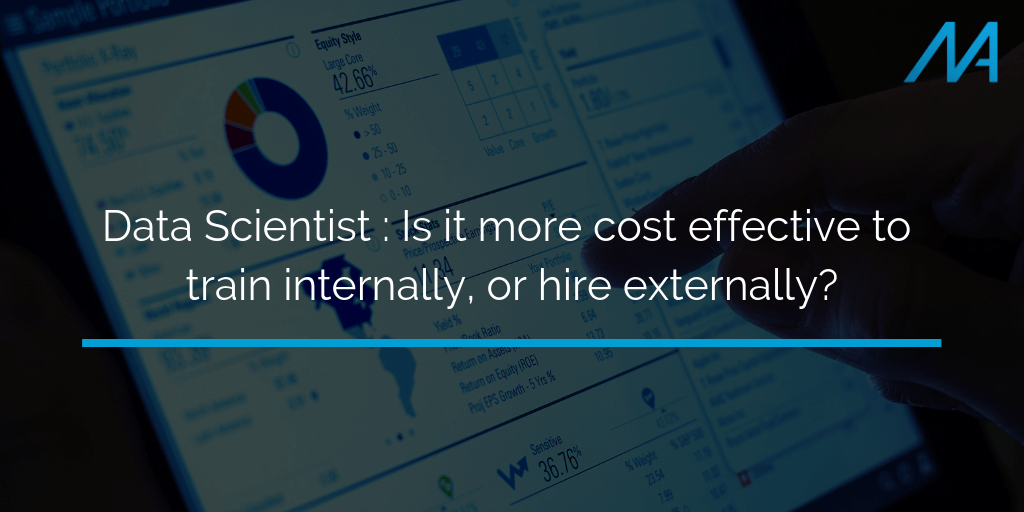Data Scientist : Is it more cost effective to train internally, or hire externally?
10 Oct, 20185 minsDubbed by some as the new oil, data makes the modern world go round.It's everywhere: w...

Dubbed by some as the new oil, data makes the modern world go round.
It's everywhere: within the click of a link, the scroll on a screen or the tap of a card. Often, we create without thought at all: with the flick of a switch or the run of a tap, the drive of a car or the pin on a map. Data is the lifeblood of the digital economy, and organisations who can draw value from volumes of information are the real winners in the big data boom.
However, while big data has taken the business world by storm, not every business is equipped to handle nor harness the vast sets of data produced by their customers. Without dedicated experts to tell the story behind the numbers, a business is unable to uncover critical customer insights from the proverbial mountains of data that piles up with each passing day.
If they are to stay ahead of the curve, they must seek to hire talented data scientists with the skills and experience necessary to bring the organisation out from the digital dark ages. Unfortunately, that's easier said than done. While on the surface, headlines telling of 56,000 new jobs created through AI and big data is good news, theses hybrid scientists-software engineers are a hard breed to come by.
Faced with a shortage of talent but a growing demand, organisations must decide whether to train internally or hire externally. Both sides of the debate may present compelling arguments but which approach is the most cost-effective?
The case for the external expert
It goes without saying that the time taken to train an employee comes at a cost. Disruption to operations through lack of available staff thanks to training programmes is a challenge many businesses face should they opt solely for this approach. What's more, data science is notoriously complex; it isn't a role that anyone can take on with just a few weeks of training.
After all, a good data scientist is more than a statistician or creator of algorithms. Despite often being seen as the number cruncher, the data scientist is more of a problem solver. Beyond mathematics, they must be equipped with a thorough understanding of the domains in which their insights will be applied. A talented mathematician may make for a strong candidate, but they should also boast a high-level knowledge of supply chain, finance, logistics and other core business functions.
It's for this reason that an employer cannot expect an inexperienced employee to hit the ground running upon completion of a short training course. By relying too heavily on this approach, businesses will see their costs continue to rise at a fast pace yet see little immediate return on their investment.
Meanwhile, competitors eager to capitalise on the large swathes of data generated by their customers scour the depths of the talent pool, luring in data scientists with attractive salaries and benefits packages. While the data science talent pool may seem sparse, those who know where to look will be sure to snap up every gem in sight.
Naturally, those who seek out the services of a specialist recruiter will pay a fee to find solid candidates in the market without delay, but when compared to the on-going training costs that come with starting from scratch, it's hardly a big pill to swallow. Having secured a competitive advantage, those training internally will find themselves playing catch-up once their staff reach a certain standard.
Finding the right balance
In the fast-paced field of data science, sourcing and securing the best and brightest in the market is the difference between understanding customer behaviours and doing random acts of marketing in the hope that something sticks.
However, while hiring externally is the most cost-effective method, the nature of data science means organisations must be prepared to provide training for these professionals to ensure they are up to date with advances in technology.
Fortunately, many universities across the globe are beginning to recognise the importance of data science, integrating data focused programmes into their business school curriculums. Soon, graduates of this discipline will seek to start their professional careers, and employers must be ready to nurture this talent through ongoing training if they wish to see results.



